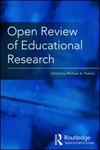新星球的新知识:人类世的批判教学法
Q1 Arts and Humanities
引用次数: 5
摘要
Petar jandriki (PJ): Ken,非常感谢你接受这次采访,也非常感谢你对本系列其他采访的宝贵建议。在完成我对您丰富的参考书目的研究后,我不禁想知道它是如何形成的。你是一名学术研究者——但你的书《我很喜欢你:1995-1996年的通信》(Acker & Wark, 2015)是一本电子邮件的合集。黑客宣言(Wark, 2004)谈到了数字技术造成的现在和未来——但街道下的海滩:国际情景主义者(2011a)的日常生活和辉煌时代坚定地致力于过去。你的写作风格密集而模糊,但你的多媒体作品,如《total for kids》(Loyer, Pyle, & Wark, 2009)讲得响亮而清晰,你经常参与实验写作,如《Speed factory》(Cohen, Kinsella, White, & Wark, 2002)。当然,这些探索现实的不同方式都集中在类似的问题上——例如,游戏玩家理论网站(2006年)作为同名书籍(2007年)的基础,而《儿童总体性》(Loyer等人,2009年)则讨论了国际情境主义者(Wark, 2008年,2011年)。用不同的方法问类似的问题,你的灵感是什么?你希望用这种方法达到什么目的?本文章由计算机程序翻译,如有差异,请以英文原文为准。
New knowledge for a new planet: critical pedagogy for the Anthropocene
Petar Jandrić (PJ): Ken, thank you a lot for this interview – and for your valuable advice regarding other interviews in this series. Upon completing my research on your rich bibliography, I could not help but wonder how it arrived into being. You are an academic researcher – but your book I’m very into you: Correspondence 1995—1996 (Acker & Wark, 2015) is a collection of emails. A hacker manifesto (Wark, 2004) speaks of the present and future caused by digital technologies – but The beach beneath the street: The everyday life and glorious times of the Situationist International (2011a) is firmly dedicated to the past. Your writing style is dense and ambiguous, yet your multimedia works such as Totality for kids (Loyer, Pyle, & Wark, 2009) speak loud and clear, and you often engage in experimental writings such as Speed factory (Cohen, Kinsella, White, & Wark, 2002). Certainly, these diverse ways of probing reality are focused to similar questions – for instance, Gamer theory website (2006) served as a base for the book with the same title (2007), while Totality for kids (Loyer et al., 2009) talks about the Situationist International (Wark, 2008, 2011a). What is your inspiration for asking similar questions using different approaches? What do you expect to achieve with such approach?
求助全文
通过发布文献求助,成功后即可免费获取论文全文。
去求助
来源期刊

Open Review of Educational Research
EDUCATION & EDUCATIONAL RESEARCH-
CiteScore
2.60
自引率
0.00%
发文量
0
审稿时长
22 weeks
 求助内容:
求助内容: 应助结果提醒方式:
应助结果提醒方式:


